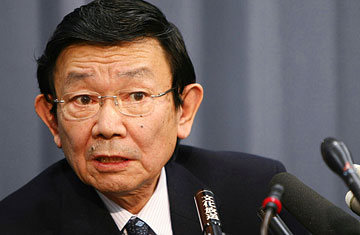
Newly appointed Japanese Finance Minister Kaoru Yosano answers questions at a press conference at his office in Tokyo on Feb. 17, 2009
To be an expert at go, or Japanese chess, a player needs patience, strategy and a sharp wit, which devotees to the game hone into a personal style. Kaoru Yosano, Japan's new economic czar, is a 7 dan, the highest level of go master. Given his reputation at the game, it's little surprise that Yosano can juggle three cabinet posts in the Japanese government: minister of the economy, minister of finance and head of the Financial Services Agency, which oversees banking. Facing what he calls "the biggest economic crisis since the Second World War," Yosano, 70, peers into the ever-deepening chasm that is the Japanese economy and tries to construct a path to the other side.
Yosano took over the finance and banking positions from former Finance Minister Shoichi Nakagawa, who resigned in mid-February after appearing to be drunk at a G-7 press conference. Prime Minister Taro Aso tapped Yosano as the ultimate insider; as minister of economy, a post he has held since September, Yosano knew his way around the draft budget for 2009. Still, the breadth of his responsibilities now is daunting. (Read "Sony's Woes: Japan's Iconic Brands Under Fire.")
A graduate of Tokyo University, like so many Japanese leaders, Yosano has some qualities that make him stand apart. As the grandson of well-known modern Romantic poets, he is virtually literary nobility. While his father was on assignment as a diplomat, the young Yosano received some of his schooling in Cairo, where he remembers being asked: what is it like to be a citizen of a defeated country? The sting of that question became the seed of his political career. After graduating with a law degree, Yosano worked five years for the Japan Atomic Power Co. before taking a job as secretary to former Prime Minister Yasuhiro Nakasone in 1968. In 1976, Yosano won a Diet seat for the Liberal Democratic Party in Tokyo prefecture, his home turf. He has served as Minister of Education, Minister of International Trade and Industry and once before as Minister of Economic and Fiscal Policy and Financial Services under Prime Minister Junichiro Koizumi, so has a broad range of governmental expertise.
He'll need it. As part of Japan's economic recovery program, Aso has told Yosano to prepare a stimulus package of a 10 trillion yen ($100 billion), at least 2% of GDP, to help create jobs, secure credit for firms and develop energy-efficient technologies. The supplementary budget to fund the stimulus is expected to go to the Diet by end of the month. (See pictures of Japan and the world.)
For Yosano, the stimulus package marks something of a break with the past. He has a reputation as a deficit hawk. As recently as 2006, when minister of the economy, he moved to slash government expenditure 40% over five years, balance the budget by 2012 and double the consumption tax to 10% by 2015. In the light of Japan's economic meltdown, all that has changed. Like other deficit-busters, Yosano has turned to old-fashioned Keynesian demand management to kick-start the economy. "He shifted completely to say that to get over this crisis we need a big stimulus package and to worry about fiscal consolidation and reducing deficits later," says Gerald Curtis, a Columbia University politics professor who has known Yosano since the late 1960s.
Yosano is able to be flexible because – unusually for a leading Japanese politician – he has no factional ties. He gets appointments the Confucian way: through merit. And his political contacts are not confined to the LDP; he plays go with opposition party president Ichiro Ozawa. As his plans become more front and center, his star seems to be on the rise. Yosano took second place to Aso in last September's elections for a new LDP leader. "Given the problems that Japan faces, people feel that there's a solid quality to Yosano, a trustworthiness that makes people feel confident he's in charge," says Curtis. In a newspaper poll conducted six weeks ago, Yosano tied with popular former Prime Minister Junichiro Koizumi as the public's second choice for the next premier. (The No. 1 pick was opposition leader Ichiro Ozawa.)
The economic czar seems to have the respect of Japan's powerful bureaucracy, which matters: longstanding friction between politicians and bureaucrats has become an obstacle to Japanese recovery. And with the Organization for Economic Co-operation and Development expecting the Japanese economy to contract by 6.6% in 2009, Yosano will need all the friends, and help, he can get. Patience and strategic sense works for go; Japan's economic mess demands no less.
